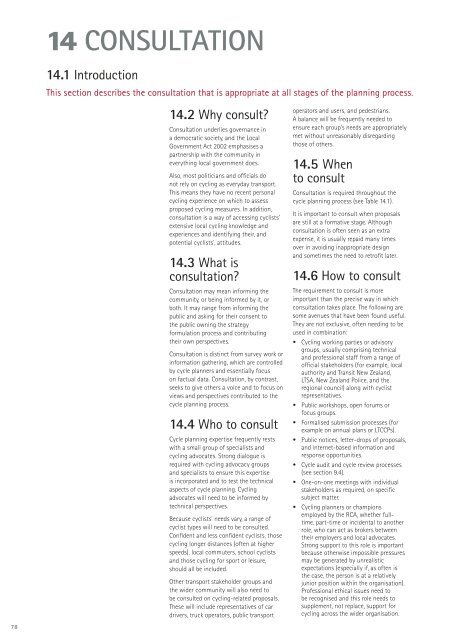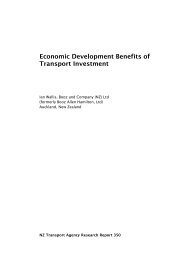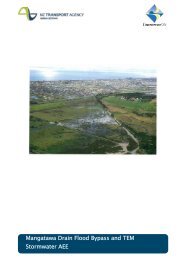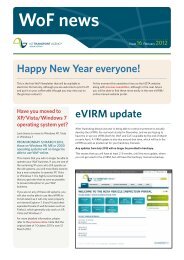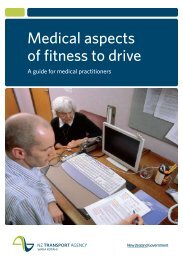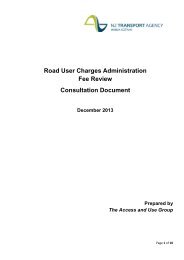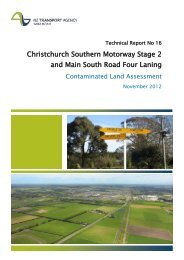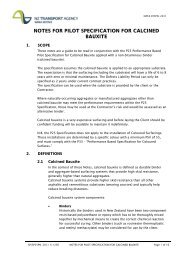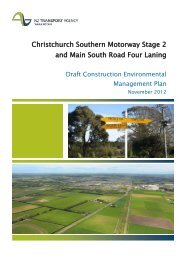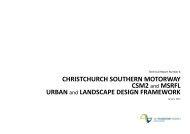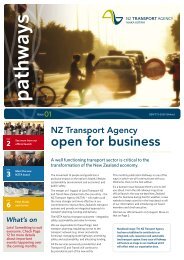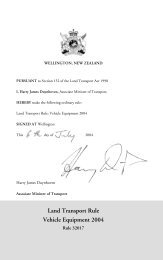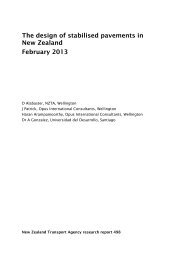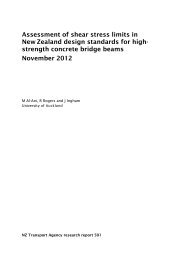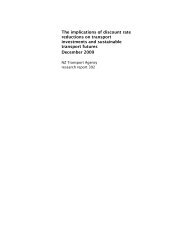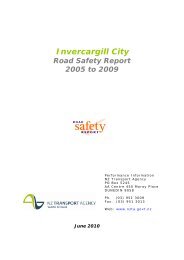Cycle network and route planning guide - NZ Transport Agency
Cycle network and route planning guide - NZ Transport Agency
Cycle network and route planning guide - NZ Transport Agency
You also want an ePaper? Increase the reach of your titles
YUMPU automatically turns print PDFs into web optimized ePapers that Google loves.
14 CONSULTATION<br />
14.1 Introduction<br />
This section describes the consultation that is appropriate at all stages of the <strong>planning</strong> process.<br />
78<br />
14.2 Why consult?<br />
Consultation underlies governance in<br />
a democratic society, <strong>and</strong> the Local<br />
Government Act 2002 emphasises a<br />
partnership with the community in<br />
everything local government does.<br />
Also, most politicians <strong>and</strong> officials do<br />
not rely on cycling as everyday transport.<br />
This means they have no recent personal<br />
cycling experience on which to assess<br />
proposed cycling measures. In addition,<br />
consultation is a way of accessing cyclists’<br />
extensive local cycling knowledge <strong>and</strong><br />
experiences <strong>and</strong> identifying their, <strong>and</strong><br />
potential cyclists’, attitudes.<br />
14.3 What is<br />
consultation?<br />
Consultation may mean informing the<br />
community, or being informed by it, or<br />
both. It may range from informing the<br />
public <strong>and</strong> asking for their consent to<br />
the public owning the strategy<br />
formulation process <strong>and</strong> contributing<br />
their own perspectives.<br />
Consultation is distinct from survey work or<br />
information gathering, which are controlled<br />
by cycle planners <strong>and</strong> essentially focus<br />
on factual data. Consultation, by contrast,<br />
seeks to give others a voice <strong>and</strong> to focus on<br />
views <strong>and</strong> perspectives contributed to the<br />
cycle <strong>planning</strong> process.<br />
14.4 Who to consult<br />
<strong>Cycle</strong> <strong>planning</strong> expertise frequently rests<br />
with a small group of specialists <strong>and</strong><br />
cycling advocates. Strong dialogue is<br />
required with cycling advocacy groups<br />
<strong>and</strong> specialists to ensure this expertise<br />
is incorporated <strong>and</strong> to test the technical<br />
aspects of cycle <strong>planning</strong>. Cycling<br />
advocates will need to be informed by<br />
technical perspectives.<br />
Because cyclists’ needs vary, a range of<br />
cyclist types will need to be consulted.<br />
Confident <strong>and</strong> less confident cyclists, those<br />
cycling longer distances (often at higher<br />
speeds), local commuters, school cyclists<br />
<strong>and</strong> those cycling for sport or leisure,<br />
should all be included.<br />
Other transport stakeholder groups <strong>and</strong><br />
the wider community will also need to<br />
be consulted on cycling-related proposals.<br />
These will include representatives of car<br />
drivers, truck operators, public transport<br />
operators <strong>and</strong> users, <strong>and</strong> pedestrians.<br />
A balance will be frequently needed to<br />
ensure each group’s needs are appropriately<br />
met without unreasonably disregarding<br />
those of others.<br />
14.5 When<br />
to consult<br />
Consultation is required throughout the<br />
cycle <strong>planning</strong> process (see Table 14.1).<br />
It is important to consult when proposals<br />
are still at a formative stage. Although<br />
consultation is often seen as an extra<br />
expense, it is usually repaid many times<br />
over in avoiding inappropriate design<br />
<strong>and</strong> sometimes the need to retrofit later.<br />
14.6 How to consult<br />
The requirement to consult is more<br />
important than the precise way in which<br />
consultation takes place. The following are<br />
some avenues that have been found useful.<br />
They are not exclusive, often needing to be<br />
used in combination:<br />
• Cycling working parties or advisory<br />
groups, usually comprising technical<br />
<strong>and</strong> professional staff from a range of<br />
official stakeholders (for example, local<br />
authority <strong>and</strong> Transit New Zeal<strong>and</strong>,<br />
LTSA, New Zeal<strong>and</strong> Police, <strong>and</strong> the<br />
regional council) along with cyclist<br />
representatives.<br />
• Public workshops, open forums or<br />
focus groups.<br />
• Formalised submission processes (for<br />
example on annual plans or LTCCPs).<br />
• Public notices, letter-drops of proposals,<br />
<strong>and</strong> internet-based information <strong>and</strong><br />
response opportunities.<br />
• <strong>Cycle</strong> audit <strong>and</strong> cycle review processes<br />
(see section 9.4).<br />
• One-on-one meetings with individual<br />
stakeholders as required, on specific<br />
subject matter.<br />
• Cycling planners or champions<br />
employed by the RCA, whether fulltime,<br />
part-time or incidental to another<br />
role, who can act as brokers between<br />
their employers <strong>and</strong> local advocates.<br />
Strong support to this role is important<br />
because otherwise impossible pressures<br />
may be generated by unrealistic<br />
expectations (especially if, as often is<br />
the case, the person is at a relatively<br />
junior position within the organisation).<br />
Professional ethical issues need to<br />
be recognised <strong>and</strong> this role needs to<br />
supplement, not replace, support for<br />
cycling across the wider organisation.


